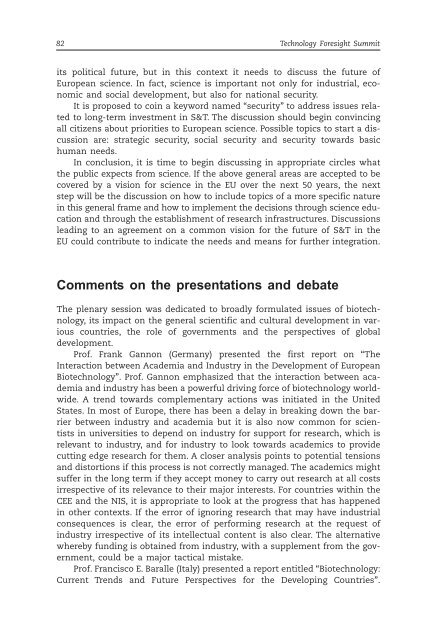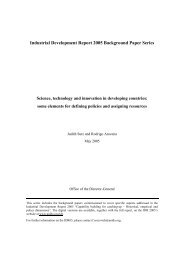TECHNOLOGY FORESIGHT SUMMIT - Unido
TECHNOLOGY FORESIGHT SUMMIT - Unido
TECHNOLOGY FORESIGHT SUMMIT - Unido
You also want an ePaper? Increase the reach of your titles
YUMPU automatically turns print PDFs into web optimized ePapers that Google loves.
82 Technology Foresight Summit<br />
its political future, but in this context it needs to discuss the future of<br />
European science. In fact, science is important not only for industrial, economic<br />
and social development, but also for national security.<br />
It is proposed to coin a keyword named “security” to address issues related<br />
to long-term investment in S&T. The discussion should begin convincing<br />
all citizens about priorities to European science. Possible topics to start a discussion<br />
are: strategic security, social security and security towards basic<br />
human needs.<br />
In conclusion, it is time to begin discussing in appropriate circles what<br />
the public expects from science. If the above general areas are accepted to be<br />
covered by a vision for science in the EU over the next 50 years, the next<br />
step will be the discussion on how to include topics of a more specific nature<br />
in this general frame and how to implement the decisions through science education<br />
and through the establishment of research infrastructures. Discussions<br />
leading to an agreement on a common vision for the future of S&T in the<br />
EU could contribute to indicate the needs and means for further integration.<br />
Comments on the presentations and debate<br />
The plenary session was dedicated to broadly formulated issues of biotechnology,<br />
its impact on the general scientific and cultural development in various<br />
countries, the role of governments and the perspectives of global<br />
development.<br />
Prof. Frank Gannon (Germany) presented the first report on “The<br />
Interaction between Academia and Industry in the Development of European<br />
Biotechnology”. Prof. Gannon emphasized that the interaction between academia<br />
and industry has been a powerful driving force of biotechnology worldwide.<br />
A trend towards complementary actions was initiated in the United<br />
States. In most of Europe, there has been a delay in breaking down the barrier<br />
between industry and academia but it is also now common for scientists<br />
in universities to depend on industry for support for research, which is<br />
relevant to industry, and for industry to look towards academics to provide<br />
cutting edge research for them. A closer analysis points to potential tensions<br />
and distortions if this process is not correctly managed. The academics might<br />
suffer in the long term if they accept money to carry out research at all costs<br />
irrespective of its relevance to their major interests. For countries within the<br />
CEE and the NIS, it is appropriate to look at the progress that has happened<br />
in other contexts. If the error of ignoring research that may have industrial<br />
consequences is clear, the error of performing research at the request of<br />
industry irrespective of its intellectual content is also clear. The alternative<br />
whereby funding is obtained from industry, with a supplement from the government,<br />
could be a major tactical mistake.<br />
Prof. Francisco E. Baralle (Italy) presented a report entitled “Biotechnology:<br />
Current Trends and Future Perspectives for the Developing Countries”.

















